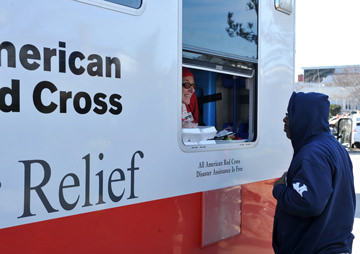American Red Cross Sunshine Act Would Open Charity to Outside Scrutiny
A House bill is being released Thursday, along with a government report citing a lack of oversight about how the charity spends the millions of dollars donated by Americans. Anton Oparin / Shutterstock
Anton Oparin / Shutterstock
By Justin Elliott, ProPublica, and Laura Sullivan, NPRThis piece originally ran on ProPublica.
Federal legislation is being unveiled today that would force the American Red Cross to do something that it has repeatedly resisted: open its books and operations to outside scrutiny.
The proposed American Red Cross Sunshine Act comes in response to a government report, also being released today, that finds oversight of the charity lacking and recommends Congress find a way to fill the gap.
Though the Red Cross has a government-mandated role responding to disasters, “no regular, independent evaluations are conducted of the impact or effectiveness of the Red Cross’s disaster services,” the Government Accountability Office report found.
The inquiry cites reporting by ProPublica and NPR about the Red Cross’ failures during Superstorm Sandy and misleading statements by CEO Gail McGovern about how the group has spent hundreds of millions of donated dollars.
The 18-month GAO examination was requested by Rep. Bennie Thompson, D-Miss., who also authored the proposed legislation. The bill would require regular government audits of the Red Cross’ finances, its response to disasters in the United States, and its work abroad.
“The public deserves and needs to know that money is going for which it is intended,” Thompson said in an interview, citing the troubled Red Cross responses after Hurricane Katrina, the earthquake in Haiti, and Superstorm Sandy.
Thompson said in an interview that the Red Cross did not cooperate fully with the inquiry, which the GAO confirmed.
“When you get pushback from the very beginning it creates doubts and suspicion in the minds of a lot of us,” Thompson said.
As we reported, last year McGovern tried unsuccessfully to get Thompson to shut down the inquiry by the GAO, which is the investigative arm of Congress.
Thompson said that McGovern’s request was the first of its kind he’d gotten in over 20 years in Congress.
The head of the GAO’s inquiry, Andrew Sherrill, said the Red Cross did not give “unfettered access” to investigators. Still, he said the GAO was able to get the information it needed. The report notes that while it reviewed Red Cross policies, it “did not assess the effectiveness or sufficiency” of the charity’s work.
In response to the pushback, Thompson added language to his bill saying the GAO can have access to any Red Cross records, including those related to the group’s “financial transactions and internal governance.”
The Red Cross did not respond to a question about its cooperation with the GAO inquiry.
In a statement on the report, the Red Cross stressed that it is not a federal agency. The group said it “believes there are several already existing mechanisms in place to evaluate our disaster response that provide considerable oversight.” The statement cited the group’s ombudsman office, its board of directors, and regular after-action reviews.
The Red Cross was chartered over a century ago by Congress and operates as a public-private hybrid: While it is funded mostly by private donations, it has an official role in the United States’ disaster response plan. The Red Cross receives a variety of benefits from the government, including tens of millions of dollars in funding in recent years. It also enjoys a one-dollar, 99-year lease on government land in Washington the charity uses for its headquarters.
If passed, Thompson’s bill would also:
-
Require audits by three inspectors general – the Treasury Inspector General for Tax Administration, the Homeland Security Inspector General, and the USAID Inspector General – to be conducted at least once every three years and to be posted publicly online.
-
Require the Department of Homeland Security to submit to Congress an annual report on its partnerships with the Red Cross on “preparedness and response capabilities.”
-
Require the Red Cross to “make prominent on its website” information on how to submit concerns to the group’s ombudsman.
The bill’s prospects in the Republican-controlled House aren’t clear.
But Thompson said he’s hopeful because disasters are not a partisan issue. The charity is also facing pressure from Sen. Charles Grassley, R-Iowa, to answer questions about its Haiti response.
If you have information about the Red Cross, its disaster operations, or blood services email [email protected].
To anonymously send us documents online, visit our SecureDrop site.
ProPublica is a Pulitzer Prize-winning investigative newsroom.
Your support is crucial...As we navigate an uncertain 2025, with a new administration questioning press freedoms, the risks are clear: our ability to report freely is under threat.
Your tax-deductible donation enables us to dig deeper, delivering fearless investigative reporting and analysis that exposes the reality beneath the headlines — without compromise.
Now is the time to take action. Stand with our courageous journalists. Donate today to protect a free press, uphold democracy and uncover the stories that need to be told.






You need to be a supporter to comment.
There are currently no responses to this article.
Be the first to respond.